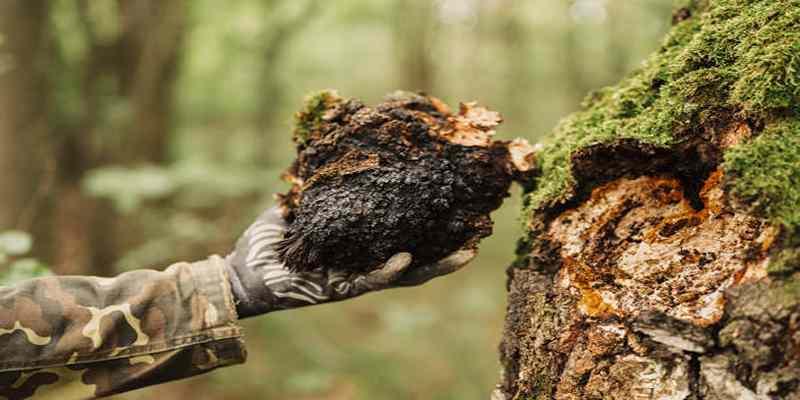Chaga mushrooms, or the "king of medicinal mushrooms," have been valued for centuries for their health benefits. In this guide, we will look at their abundant nutritional profile, health benefits, and ways to implement chaga into your daily wellness plan.
What are Chaga Mushrooms?

Chaga mushrooms (Inonotus obliquus) are a fungus that only grow on birch trees in cold, northern latitudes like Siberia, Canada, Alaska, and some areas of Northern Europe. Chaga does not look like traditional mushrooms at all; it is a dark, charcoal-colored mass on the tree bark, and hence, it has the nickname "birch canker." Chaga has been valued for its powerful bioactive substances and health contributions in spite of its rough, unprepossessing appearance.
Historical and Cultural Importance
For hundreds of years, the chaga mushroom has been an important part of the natural healing traditions of several societies. Ancient Siberian cultures were among the first to appreciate the healing qualities of the mushroom and employed it to enhance immunity and overall well-being.
Traditional Chinese medicine and Eastern European herbal treatments also praise chaga as a potent adaptogen, supporting homeostasis and resistance to stress. Tied up in folklore through much of history, chaga has traditionally been regarded as a gift of the forest with spiritual properties, representing strength and health.
Where Chaga Mushrooms Are Typically Found
Chaga mushrooms thrive in colder climates and are most commonly found adhering to birch trees in boreal forests. These regions include the subarctic areas of Siberia, Canada, Scandinavia, and Northern Asia. The mushroom absorbs nutrients and compounds from its host tree, particularly betulin, which contributes to its renowned health-boosting properties. Its environment and host tree are vital to its growth, making chaga a truly unique and location-specific natural resource.
Nutritional Profile
Chaga mushrooms are a powerhouse of nutrients, celebrated for their numerous health benefits. Rich in antioxidants, vitamins, and minerals, they have gained popularity as a natural remedy for various ailments. Below are some key nutritional aspects and benefits of chaga, categorized into subheadings:
1. Antioxidants and Immune Support
Chaga mushrooms are packed with antioxidants, particularly superoxide dismutase, which helps neutralize harmful free radicals in the body. These antioxidants support the immune system by strengthening the body's natural defenses against illnesses and infections. Regular inclusion of chaga may enhance overall health and reduce oxidative stress.
2. Rich in Essential Nutrients
Chaga mushrooms provide a variety of essential vitamins and minerals, including vitamin D, potassium, and zinc. These nutrients contribute to maintaining healthy bones, regulating blood pressure, and supporting enzyme activities. The nutritional profile of chaga makes it an excellent addition to a balanced diet, catering to both general wellness and specific nutritional gaps.
3. Supports Digestive Health
The polysaccharides in chaga mushrooms promote gut health by fostering a healthy balance of gut bacteria. This can improve digestion and nutrient absorption while reducing inflammation in the digestive tract. Consuming chaga regularly may aid in managing issues like indigestion and promoting overall gastrointestinal health.
4. Potential Anti-Inflammatory Properties
Chaga contains compounds, such as betulinic acid, that are believed to exhibit anti-inflammatory effects. This property can be beneficial for people dealing with chronic inflammation, which is linked to various health conditions like arthritis. Chaga may help reduce symptoms and improve the quality of life for individuals facing persistent inflammatory issues.
Ways to Consume Chaga Mushrooms
Chaga mushrooms can be incorporated into your daily routine in various ways to harness their health benefits. From teas to supplements, there are versatile methods to enjoy this superfood while enhancing your wellness. Below are some common ways to consume chaga mushrooms.
1. Chaga Tea

One of the most popular ways to consume chaga mushrooms is by brewing them into tea. To make chaga tea, you can use dried chunks or powdered chaga. Simply steep the mushroom in hot water for an extended period to extract the beneficial compounds. The resulting tea has a rich, earthy flavor and can be enjoyed warm or cold. Chaga tea is caffeine-free, making it an excellent option for any time of the day. Regular consumption may help support immunity and overall vitality.
2. Chaga Tinctures
Chaga tinctures are a concentrated form of the mushroom's nutrients and are typically taken in small doses. These are created by extracting the beneficial components of the mushroom using a dual-extraction method that also involves water. Tinctures are convenient and allow you to consume chaga easily by adding drops to water, tea, or directly under your tongue. They are ideal for those seeking a quick and efficient way to integrate chaga into their routines while reaping its potential health benefits.
3. Chaga Powder in Smoothies
Adding chaga powder to your smoothies is another simple and versatile way to consume it. You can blend the powder with fruits, greens, and non-dairy milk to create a nutrient-packed drink. This method allows you to enjoy chaga without altering the natural flavor of your smoothie significantly. Incorporating chaga powder in smoothies is an excellent choice for those with busy lifestyles, offering both convenience and a nutritional boost to your diet.
4. Chaga Capsules or Supplements
For the ultimate convenience, chaga mushrooms are often available in capsule or supplement form. These pre-packaged capsules are easy to take and ensure a consistent dosage every time. For those who prefer a no-fuss option or find brewing chaga tea impractical, this is a great alternative. Chaga capsules retain the mushroom’s beneficial compounds and allow people to enjoy its health-promoting effects on the go. Always follow dosage instructions provided by the manufacturer to ensure safe consumption.
Potential Side Effects and Precautions
Chaga is generally considered safe for most people when consumed in moderation. However, certain individuals should exercise caution due to potential side effects or interactions. It is important to consult with a healthcare provider before adding chaga to your routine, especially if you have underlying health conditions or take medications.
- Chaga may lower blood sugar levels, so individuals with diabetes should monitor their blood glucose closely.
- It could interact with anticoagulant medications, potentially increasing the risk of bleeding.
- Those with autoimmune conditions should consult a doctor, as chaga may stimulate the immune system.
- Breastfeeding individuals should seek medical advice before using chaga.
Sustainability and Ethical Harvesting
Chaga mushrooms are harvested from birch trees in forests across Russia, China, and Canada. Sustainable harvesting is crucial, as some companies overharvest for profit. Look for brands that prioritize ethical practices by leaving part of the mushroom to regrow.
Conclusion
Choosing sustainably sourced chaga mushrooms supports ethical practices, preserves birch forests, and protects ecosystems. Supporting sustainable companies lets consumers enjoy chaga’s benefits while helping the environment. Responsible harvesting ensures this valuable fungus remains available for future generations.












